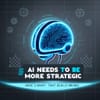Joe McKendrick argues that many companies are treating AI as a bolt-on productivity tool instead of a long-term strategic asset. He points to the MIT study showing 95% of generative-AI initiatives failing as a wake-up call: superficial, tactical deployments don’t drive real business value. In contrast, deep, narrowly focused projects that align closely with a company’s core strategy tend to yield measurable results.
Drawing on insights from thought leaders like Tom Davenport and Sangeet Paul Choudary, McKendrick explains that strategy isn’t just about applying AI to what you already do — it’s about rethinking what you do. He uses the metaphor of the shipping container: when that innovation first emerged, people saw only immediate automation, but its true impact came later when it rewrote global logistics and manufacturing. AI, he says, has similar potential to change the foundational assumptions of business.
To make AI strategic, McKendrick highlights several leadership lessons from Davenport. First, companies need to decide where they want to “play” (which business areas to transform) and how they intend to “win” (what competitive edge AI will give them). These initiatives will often require more time, bigger investments, and more cross-functional collaboration than tactical experiments.
Finally, McKendrick argues that successful AI strategy depends strongly on company culture, talent, and governance. It’s not enough to run isolated pilots; businesses must create a vision for how AI transforms their business model over time. That means building the right structures — from data infrastructure to leadership alignment — to deliver long-term returns.


